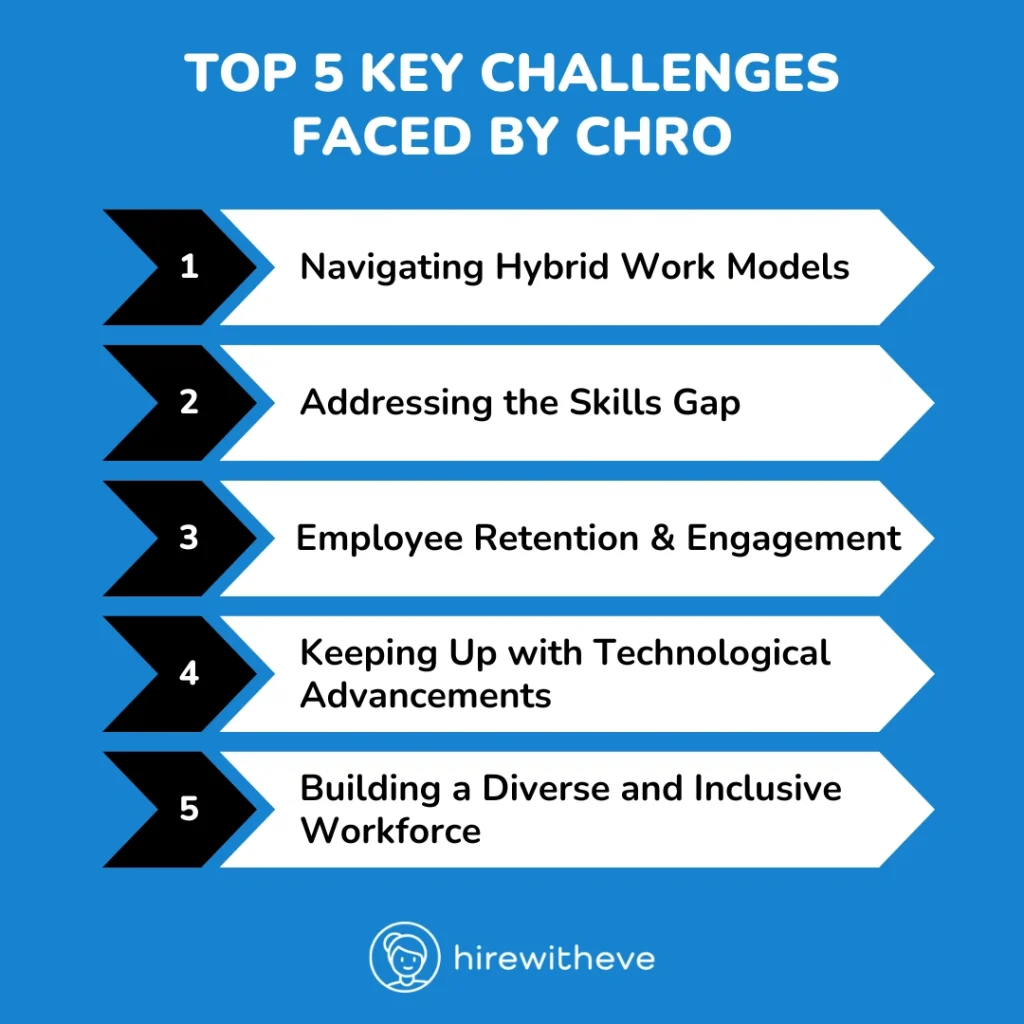Top 5 Key Challenges Faced by CHRO

In today’s ever-evolving business landscape, Chief Human Resources Officers (CHROs) are tasked with managing a range of complex issues that affect both employees and the organization as a whole. From navigating the shifting demands of a post-pandemic workforce to leveraging technology for better talent acquisition, the challenges faced by CHROs are more intense than ever before. These professionals must be agile, data-driven, and future-focused to stay ahead of these challenges and deliver value to their organizations.
In this blog, we will explore the top 5 key challenges faced by CHROs today, offering insights into the problems and potential solutions that talent acquisition specialists and HR managers should keep in mind.
What are the Top 5 Key Challenges Faced by CHRO?

Navigating Hybrid Work Models
One of the most pressing challenges faced by CHROs today is adapting to the new normal of hybrid work models. Many organizations now offer a combination of remote and in-office work, requiring CHROs to rethink how they manage teams, track productivity, and maintain company culture. While hybrid work offers flexibility and broader talent pools, it also brings challenges like ensuring effective communication, monitoring employee well-being, and maintaining fairness in performance evaluations across different work settings.
A survey conducted by Gartner shows that nearly 82% of companies plan to allow employees to work remotely at least part of the time. This shift demands that CHROs create policies that support a flexible yet productive workforce. Ensuring that technology and tools are in place to foster collaboration, while also maintaining engagement levels across both remote and on-site employees, is a challenge that cannot be overlooked.
Addressing the Skills Gap
Another significant challenge faced by CHROs is the widening skills gap in the workforce. As industries rapidly evolve due to technological advancements, many employees are finding that their current skills are no longer sufficient to meet the demands of their roles. The World Economic Forum estimates that by 2025, 50% of all employees will need reskilling. This puts enormous pressure on CHROs to ensure that their workforce is continuously learning and adapting to new skills, whether through internal training programs or external hiring.
Recruiting talent with the right skills has become more difficult as the competition for skilled workers intensifies. To stay competitive, CHROs must adopt a skills-based hiring approach, which involves evaluating candidates based on their abilities rather than just their qualifications or previous experience. This approach helps bridge the skills gap but also requires HR leaders to rethink traditional hiring methods.
Employee Retention and Engagement
Retention and engagement remain critical challenges faced by CHROs in 2024. With the rise of remote work and increasing employee expectations for flexibility and autonomy, organizations are grappling with higher turnover rates and disengaged workers. A Gallup report found that only 36% of U.S. employees are engaged in their work, while the cost of replacing an employee can range from one-half to two times their annual salary.
For CHROs, the focus should be on creating a compelling employee value proposition that keeps talent engaged and committed. This could involve offering personalized career development plans, providing competitive benefits, and fostering a workplace culture that prioritizes employee well-being and mental health.
Keeping Up with Technological Advancements
The rise of automation, AI, and data analytics is reshaping the HR landscape. However, keeping up with these technological advancements is a significant challenge faced by CHROs. As HR departments adopt new tools and platforms, CHROs must ensure that their teams are equipped to leverage these technologies effectively. This involves not only choosing the right technology but also investing in training and change management to make sure that these tools are used to their full potential.
Technological advancements can streamline processes such as recruitment, performance reviews, and employee engagement tracking. However, they also require CHROs to balance the human aspect of HR with automation, ensuring that technology enhances rather than detracts from employee experiences.
Building a Diverse and Inclusive Workforce
Diversity, equity, and inclusion (DEI) have moved to the forefront of corporate priorities, but achieving a truly diverse and inclusive workforce remains a challenge faced by CHROs. Organizations are under increasing pressure from employees, customers, and stakeholders to create environments that are welcoming to people of all backgrounds, identities, and abilities.
However, fostering diversity goes beyond recruitment efforts; it involves building an inclusive culture where all employees feel valued and have opportunities for advancement. CHROs must be proactive in addressing unconscious biases in hiring, promotion, and performance evaluations. They also need to ensure that leadership is committed to DEI initiatives and that there are clear metrics in place to track progress.
A study by McKinsey & Company found that companies in the top quartile for racial and ethnic diversity are 35% more likely to have financial returns above their industry medians. This demonstrates that DEI is not just a moral imperative but a business one as well.
Conclusion
The challenges faced by CHROs today are complex and multifaceted, but tools like HirewithEve.ai are designed to simplify many aspects of talent acquisition and management. HirewithEve.ai offers a range of features that can help CHROs navigate these hurdles:
Skills-Based Hiring: With HirewithEve.ai’s skills-based hiring approach, HR professionals can address the skills gap by focusing on candidates’ abilities rather than just their credentials, ensuring they find the right fit for each role.
Data-Driven Insights: Leveraging data analytics, HirewithEve.ai gives HR teams the insights needed to make informed decisions about recruitment, employee performance, and retention, helping organizations keep up with technological advancements.
Diversity and Inclusion Features: The platform offers features to help CHROs track and promote diversity and inclusion within their organizations, ensuring that DEI initiatives are more than just checkboxes but integrated into the company’s fabric.
By addressing these key challenges faced by CHROs, HirewithEve.ai empowers HR leaders to build a resilient, engaged, and diverse workforce, positioning their organizations for long-term success.
